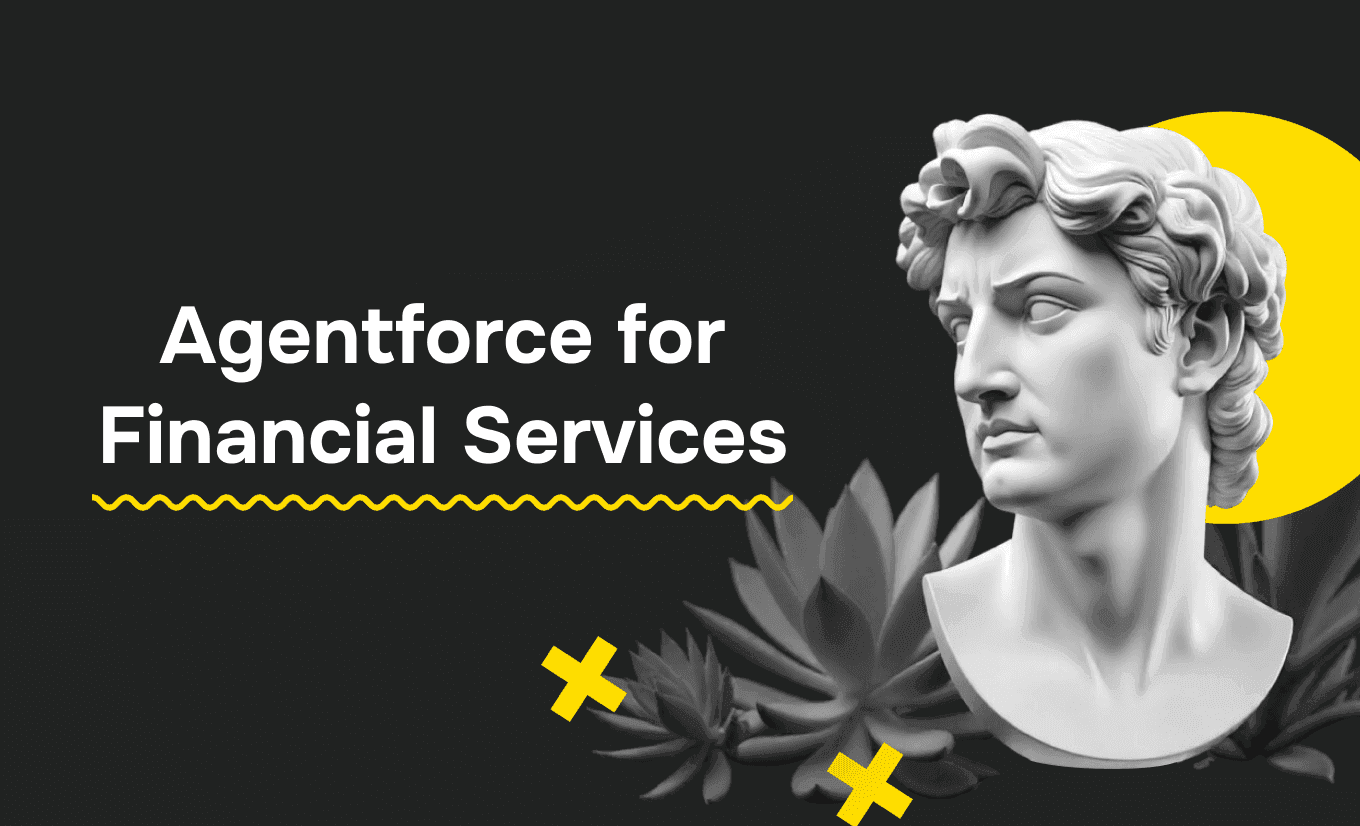The financial services industry, including banks, insurers, and wealth management firms, is under increasing strain from multiple directions. A shrinking workforce, rising customer expectations, and evolving regulatory landscapes are converging to create unprecedented operational challenges.
In the insurance sector alone, half of the current workforce is expected to retire within the next 15 years, while projections indicate a shortfall of 100,000 financial advisors by 2034 if productivity levels remain unchanged.
For financial services providers, this gap between expectations and capacity is a pressing problem. Advisors, bankers, and insurance professionals spend just 39% of their time engaging directly with clients and building client relationships. Administrative tasks consume the remainder: updating records, preparing for meetings, verifying documents, or processing claims.
Agentforce for Financial Services, built directly into Salesforce Financial Services Cloud, addresses these issues by introducing AI-powered digital labor specifically designed for the workflows, compliance requirements, and customer needs of banks, insurers, and wealth managers.
With Agentforce, financial institutions can tap into digital labor built on a deeply unified platform to help their human teams boost productivity, efficiency, and revenue.
In this article, we’ll explore how Agentforce for Financial Services works, where it delivers the most value, and why it is becoming an essential asset for forward-looking financial institutions.
Why Agentforce Is a Game Changer for Financial Services
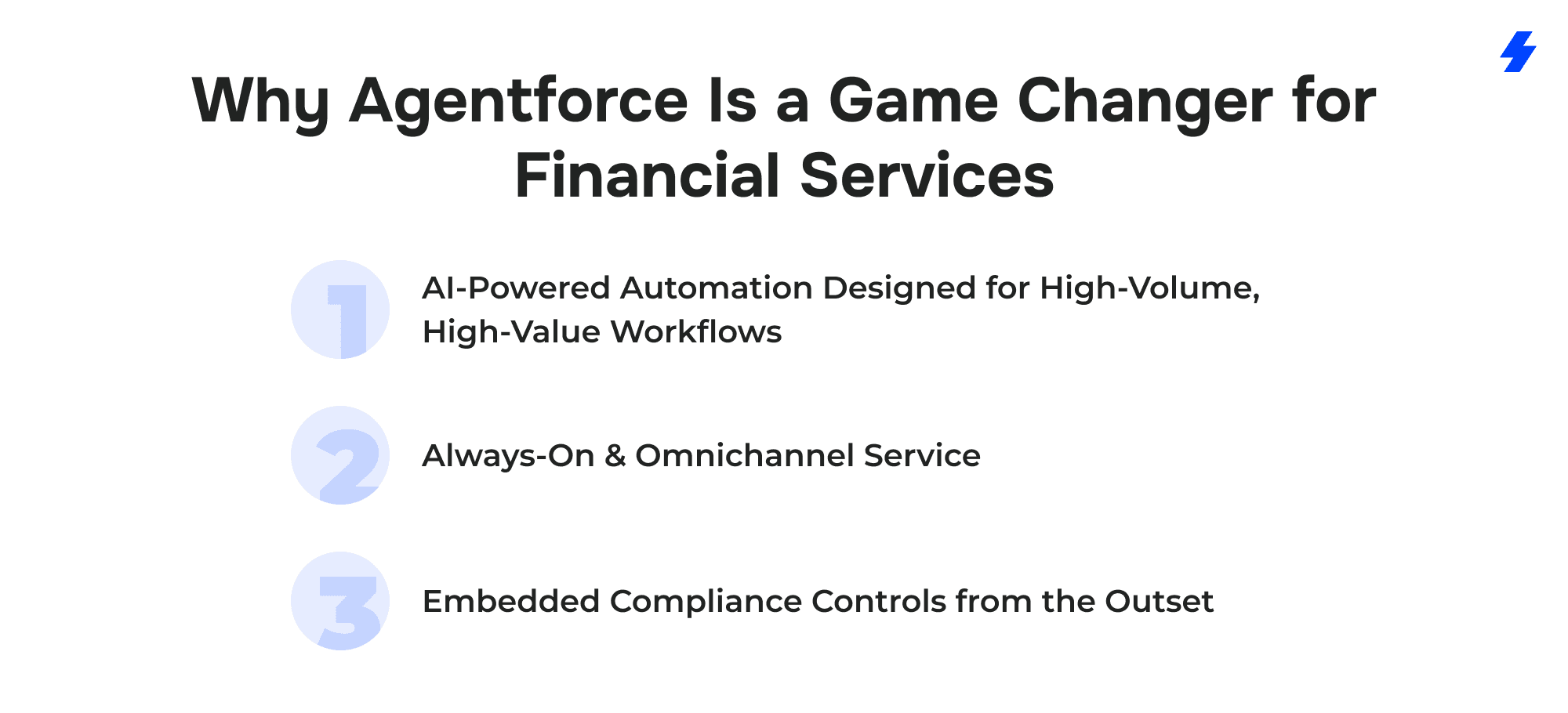
The value of Agentforce lies not only in its ability to automate work but in how it understands the unique operating environment of financial services organizations.
Unlike generic AI platforms, Agentforce is preconfigured with skills, workflows, and compliance frameworks that map directly to the realities of financial services, enhancing operational efficiency. Absa Relationship Banking highlights how Agentforce is speeding up response times, empowering their service team to resolve pressing customer issues 88% faster. This means institutions can deploy it faster, with less customization, and see measurable results sooner. The result is stronger customer relationships built on speed, accuracy, and personalization.
AI-Powered Automation Designed for High-Volume, High-Value Workflows
Agentforce automates essential but time-consuming activities such as client onboarding, policy renewals, key front office tasks like loan processing, and meeting preparation. For insurance workflows, Insurance Service Agents handle claims verification, policy updates, and customer requests efficiently and in full compliance.
For example, in loan processing, the system can collect client data, check eligibility, and prepare a complete case file for a human loan officer, drastically reducing the time from inquiry to approval.
In customer service, it can handle account balance requests or fee reversals instantly, reducing wait times and freeing agents to focus on complex inquiries.
Always-On, Omnichannel Service
Customers can reach Agentforce-powered support any time, through the channel of their choice, web chat, mobile app, SMS, or email, and receive consistent, personalized responses. These agents can also anticipate customer needs by leveraging unified data models.
This consistency creates opportunities for more valuable customer engagement, even outside traditional business hours.
For example, a customer starting a mortgage inquiry at midnight can have the process initiated, eligibility checked, and follow-up scheduled before a human team member even begins their workday.
Embedded Compliance Controls from the Outset
Agentforce operates entirely within the compliance framework of Salesforce Financial Services Cloud, enforcing rules for approvals, disclosures, and audit trails at every step.
Each action is logged, traceable, and aligned with applicable regulations, from FINRA and GDPR to HIPAA and PCI-DSS. This ensures that automation doesn’t introduce risk; it actively strengthens audit readiness. Acting as a built-in Process Compliance Navigator, Agentforce ensures every workflow meets industry and regulatory requirements.
Real-World Use Cases of Agentforce in Financial Services
The most compelling demonstration of Agentforce’s value lies in the way it transforms day-to-day operations across banking, insurance, and wealth management.
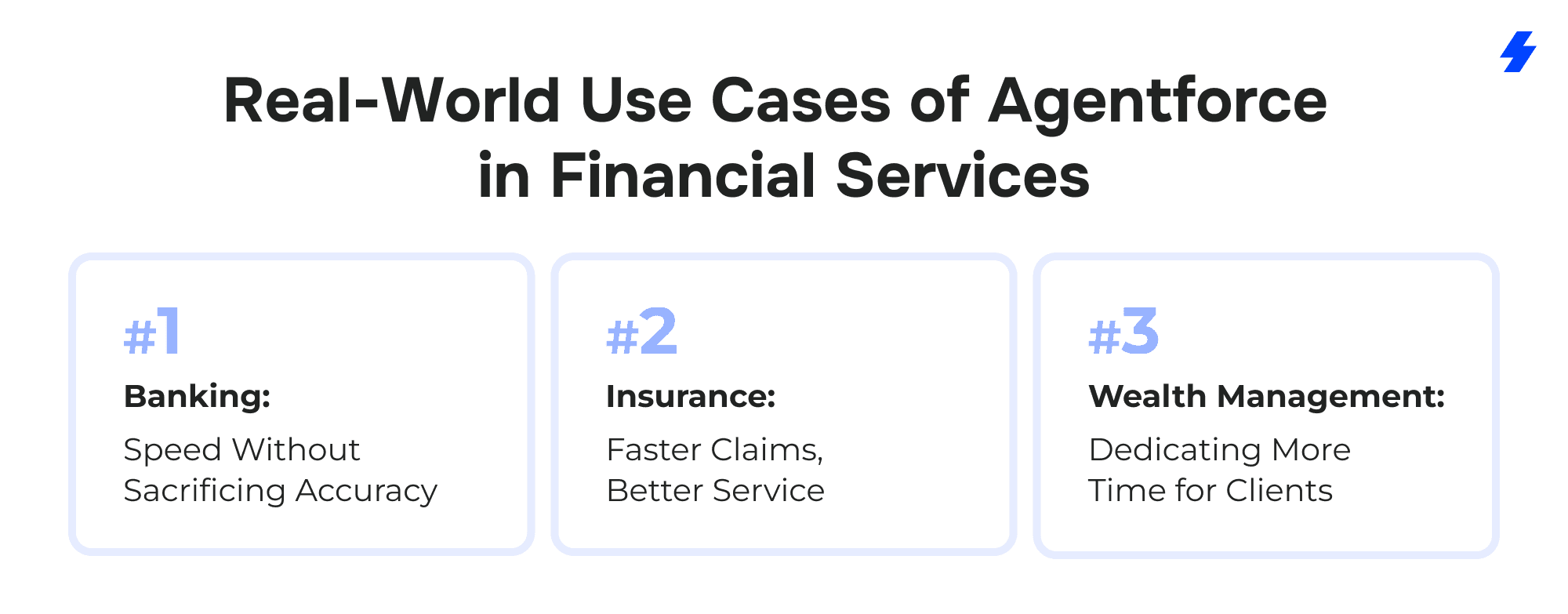
Banking: Speed Without Sacrificing Accuracy
Retail banks often face high volumes of routine service requests and other repetitive inquiries that can overwhelm call centers and branch staff.
Agentforce’s Banking Service Agent automates tasks such as fee reversals, lost card cancellations, and loan status updates.
A digital loan officer agent can guide borrowers through product discovery, guide borrowers through product discovery, surfacing relevant loan options based on their profile and transaction patterns. This reduces time-to-approval, improves conversion rates, and minimizes application abandonment.
Insurance: Faster Claims, Better Service
In insurance, speed and clarity are critical during claims or policy servicing. Agentforce streamlines claims management by verifying documents, checking policy details, and escalating exceptions for human review.
For quoting, it analyzes customer-provided data and matches it with tailored policy options in real time, improving both accuracy and conversion rates.
Wealth Management: More Time for Clients
For wealth advisors, preparation and follow-up can consume hours each week. Agentforce’s Financial Advisor Agent assembles meeting agendas from portfolio performance data, past customer interactions, upcoming client milestones, transaction data, and relevant client insights drawn from unified data sources.
After meetings, it generates summaries, updates plans, and assigns follow-up tasks automatically. This means more time for building relationships and advising clients.
Benefits of Implementing Agentforce
The impact of Agentforce adoption reaches far beyond time savings. By embedding AI-powered digital labor into internal operations, financial institutions can increase capacity, improve service quality, and drive customer success while reducing costs and adapting quickly to market changes. Early adopters across banking, insurance, and wealth management are already demonstrating better business outcomes.
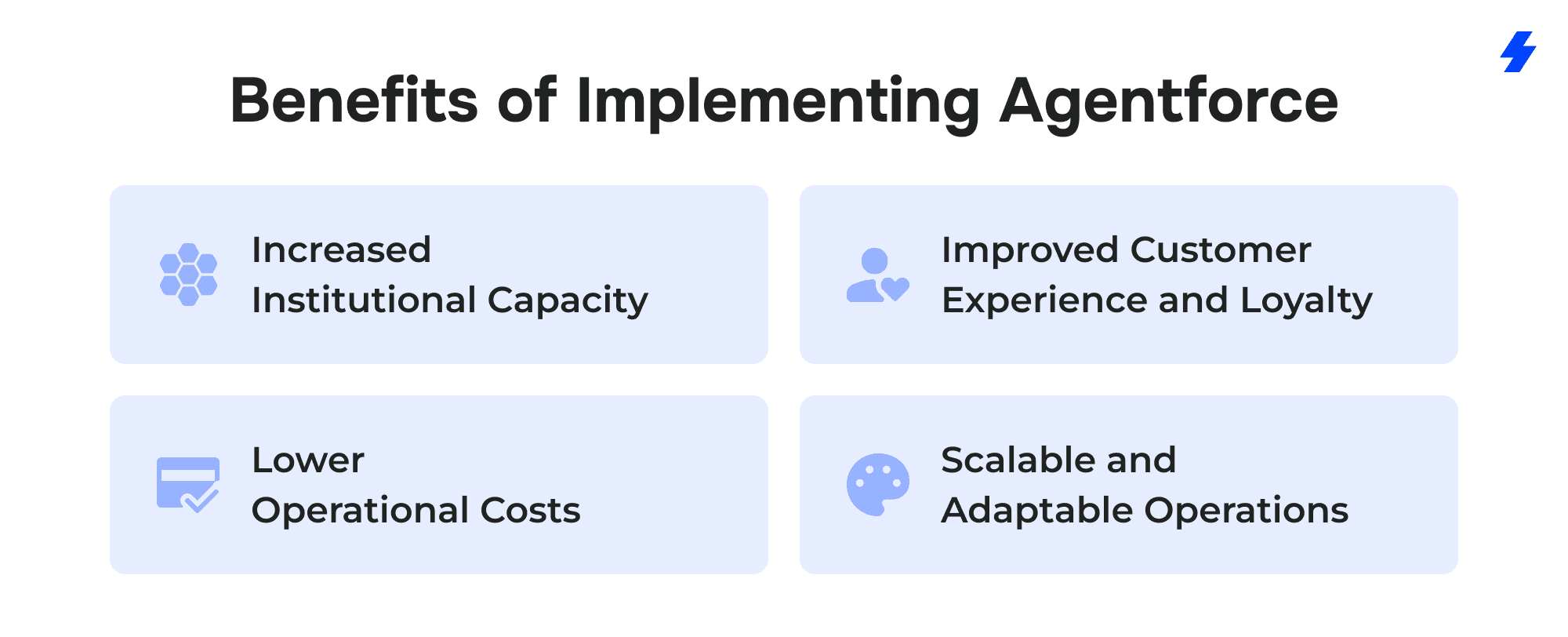
Increased Institutional Capacity
In an industry facing significant talent shortages, including a forecast that 50% of insurance professionals will retire within the next 15 years and an anticipated shortfall of 100,000 financial advisors by 2034, the ability to serve more customers without proportional headcount growth is critical.
Agentforce enables exactly that by taking on high-volume, low-complexity tasks, including repetitive customer inquiries, and autonomously managing routine inquiries that previously required human intervention.
Improved Customer Experience and Loyalty
Customer satisfaction in financial services is often tied to speed, personalization, and consistency.
In an era where clients expect instant, personalized service, Agentforce delivers consistent value at every touchpoint. Agentforce enhances this by giving a service team more opportunities for personal engagement that strengthens trust and loyalty.
Yet today, only 21% of consumers feel fully satisfied with the personalization they receive, and 35% say they feel like just another number. Agentforce addresses this by delivering 24/7, omnichannel support that’s informed by unified customer data from Salesforce Financial Services Cloud to maintain regulatory confidence.
Lower Operational Costs
By automating repetitive processes that previously required human intervention, Agentforce significantly reduces the cost per transaction and enhances risk management. These savings can be reinvested into strategic initiatives such as expanding into new markets, developing digital-first products, or enhancing fraud management and detection capabilities.
Scalable, Adaptable Operations
Financial services is a fast-moving sector where product offerings, regulatory requirements, and customer expectations can change rapidly. Agentforce’s low-code/no-code customization capabilities allow institutions to adjust workflows, add new services, and meet compliance updates without lengthy IT projects.
Because Agentforce is natively integrated into Salesforce, changes can be implemented and deployed across the organization quickly, ensuring agility in response to market trends and regulatory changes.
Implementation Strategy for Agentforce
While Agentforce delivers immediate value through its prebuilt capabilities, its long-term impact depends on a deliberate and well-structured rollout. Implementing AI-powered automation in a regulated financial environment is about aligning technology with institutional priorities, compliance frameworks, and customer expectations. Agentforce functions as an industry-specific digital workforce, pre-trained for commercial banking, insurance, and wealth management contexts.
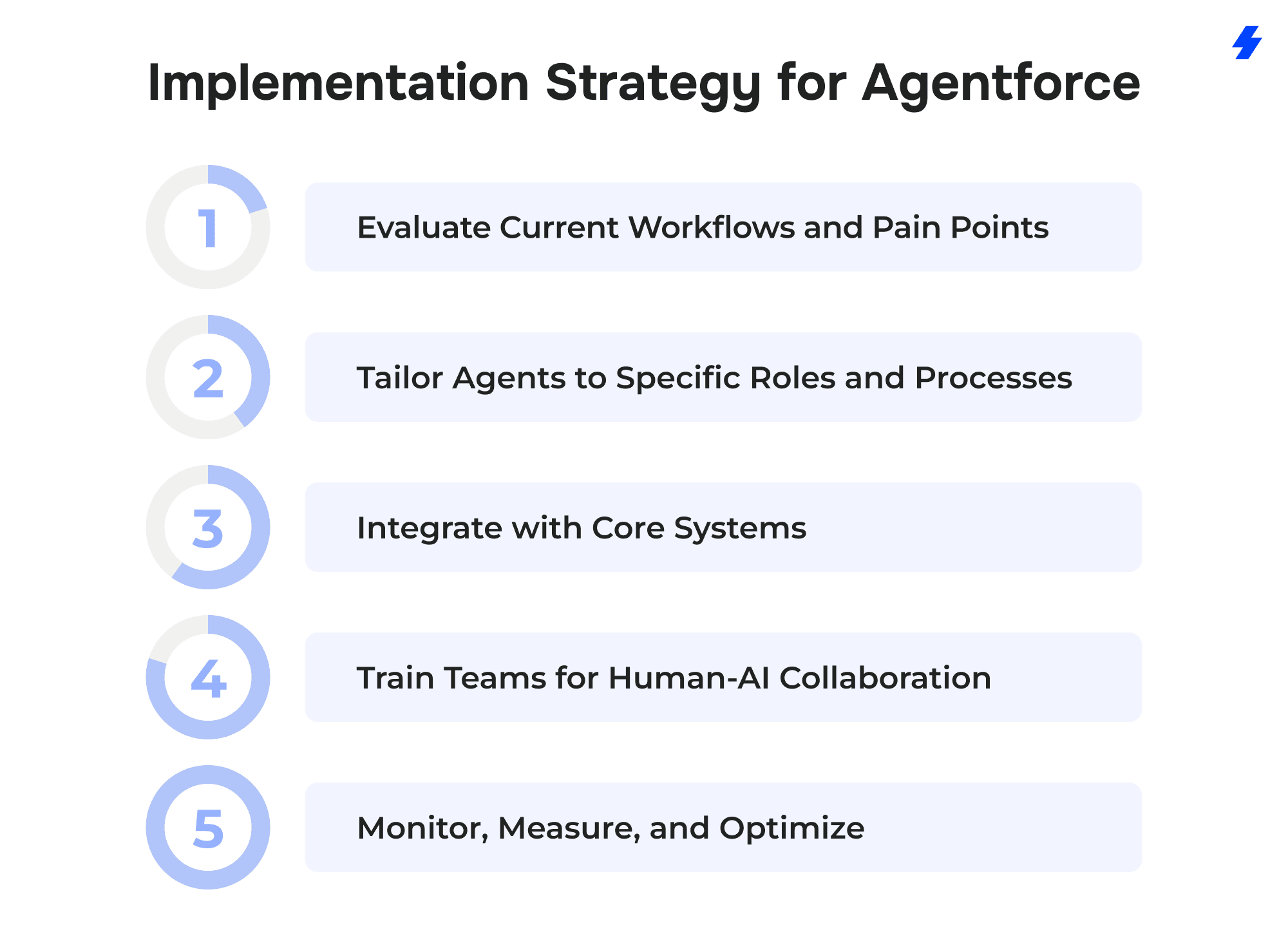
1. Evaluate Current Workflows and Pain Points
The first step is a thorough operational audit to determine where Agentforce will provide the most significant return on investment. In financial services, these opportunities often exist in high-volume, repetitive processes that carry either a substantial time cost or compliance risk.
Examples include loan origination steps, policy renewals, fraud alerts, claims verification, and routine account servicing.
Institutions should quantify these processes in terms of transaction volumes, average handling times, and error rates.
For example, if fee reversal requests account for a large percentage of service calls and require multiple system lookups, automating this workflow with a Banking Service Agent could free hundreds of hours per quarter.
2. Tailor Agents to Specific Roles and Processes
Agentforce comes with role-specific templates for banking, insurance, and wealth management, including Financial Advisor Agents, Banking Service Agents, and Digital Loan Officers.
However, these templates are starting points. To maximize relevance and adoption, they must be adapted to reflect the institution’s unique service policies, tone of communication, approval hierarchies, and compliance triggers.
Low-code customization tools enable the incorporation of institution-specific data models, custom actions, and workflows without lengthy development cycles.
For example, a wealth management firm could configure its advisor agents to automatically pull in ESG portfolio data for clients interested in sustainable investing.
3. Integrate with Core Systems
The strength of Agentforce lies in its ability to work seamlessly within the broader technology ecosystem. Integration with core banking systems, claims processing platforms, CRM databases, and portfolio management tools ensures that AI agents operate with accurate, up-to-date information.
For instance, when a customer requests a loan payoff amount, the Banking Service Agent should retrieve this directly from the core banking platform in real time, ensuring accuracy and reducing the risk of outdated or inconsistent financial data. Integration should also extend to customer-facing channels, such as mobile apps, web portals, and contact center platforms, to deliver a consistent experience regardless of entry point.
4. Train Teams for Human-AI Collaboration
The most successful Agentforce deployments treat AI agents as team members rather than standalone tools. This requires preparing employees to collaborate effectively with AI, review and approve outputs where needed, and understand when to take over a case for complex or sensitive situations.
Training should address not just technical usage but also trust-building. Employees need confidence that Agentforce’s recommendations are accurate and compliant. Interactive workshops, pilot projects, and shadow modes (where AI assists without directly executing actions) can help bridge this gap and accelerate adoption.
5. Monitor, Measure, and Optimize
Implementation is not the endpoint; it’s the beginning of a continuous improvement cycle that includes training digital workers . Institutions should define and track key performance indicators (KPIs) such as:
- Resolution time: How much faster are cases closed compared to pre-implementation benchmarks?
- Deflection rate: What percentage of inquiries are fully resolved by AI agents without human intervention?
- Compliance adherence: Are all required approvals, disclosures, and audit logs being generated consistently?
- Customer satisfaction (CSAT/NPS): How is the customer experience evolving with Agentforce in place?
By regularly reviewing these metrics, institutions can identify opportunities to refine agent behavior, expand automation into new workflows, and ensure continued alignment with business objectives and regulatory requirements.
Why Choose MagicFuse for Agentforce Implementation in Financial Services
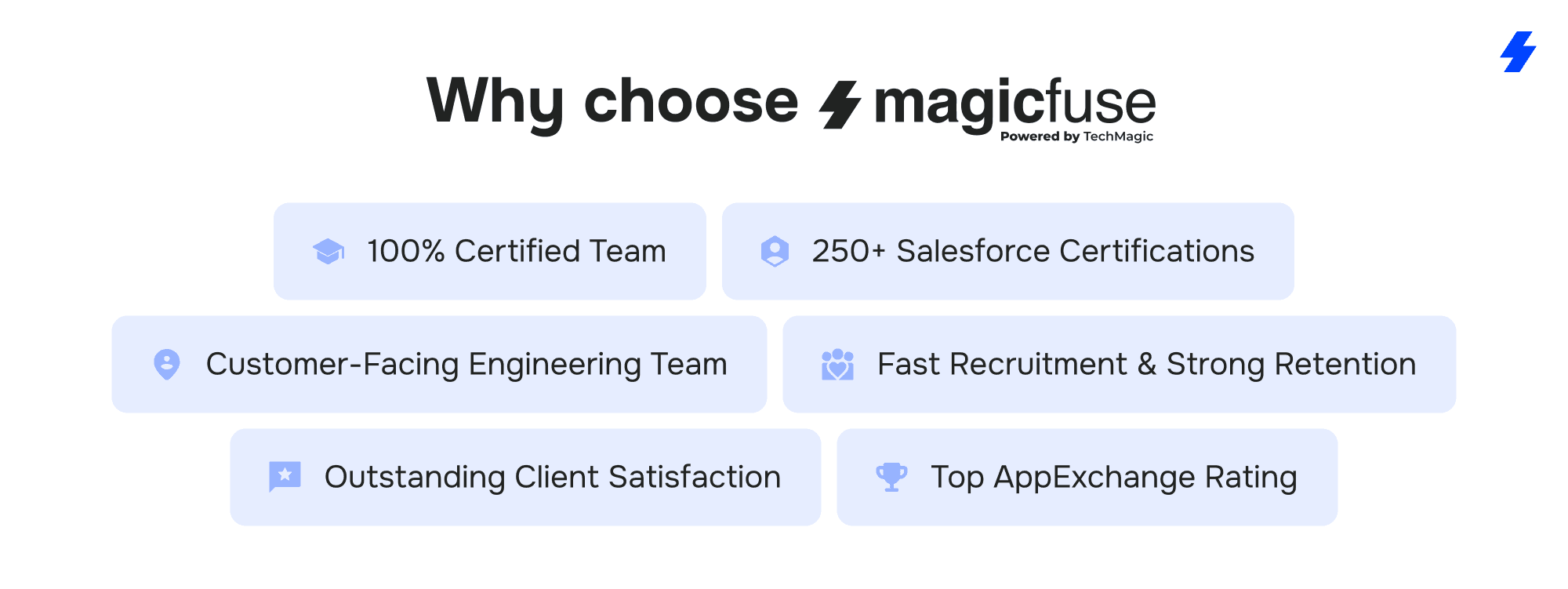
100% Certified Team
Our entire engineering team holds Salesforce certifications, ensuring expert-level knowledge and proven skills to deliver reliable, high-quality solutions.
250+ Salesforce Certifications
With over 250 certifications earned, including recent ones like Experience Cloud Consultant, Data Cloud Consultant, B2B Solution Architect, and more, we stay at the forefront of Salesforce innovations to meet your evolving needs.
Customer-Facing Engineering Team
We believe in full transparency. Our clients have direct access to our engineers and resources, with no hidden layers, enabling smooth communication and collaborative problem-solving.
Fast Recruitment & Strong Retention
We recruit top Salesforce experts quickly, averaging 6 weeks per hire, while maintaining strong employee retention of over 3 years to provide consistent expertise on your projects.
Outstanding Client Satisfaction
Our commitment to quality is reflected in an impressive Net Promoter Score of 92%, showing that clients trust and recommend our services.
Top AppExchange Rating
With a stellar 4.9-star rating on Salesforce AppExchange, we demonstrate consistent excellence and customer satisfaction in the Salesforce ecosystem.
Conclusion
The pressures on financial institutions, from workforce constraints to rising customer expectations, are not going away. Meeting them will require smarter use of resources, better data integration, and automation that strengthens rather than replaces the human connection.
Agentforce for Financial Services delivers precisely that. It allows institutions and financial professionals to reclaim time for high-value client engagement, accelerate routine workflows, and maintain compliance without compromise. The statistics from early adopters speak for themselves: faster resolutions, hundreds of hours saved, and measurable improvements in client satisfaction — all while helping human teams boost productivity and job satisfaction.
For banks, insurers, wealth management firms, and providers of wealth management services ready to scale service and optimize client care operations without scaling costs, Agentforce is a pathway to sustainable growth.
Contact MagicFuse today to see how Agentforce can be configured to your institution’s unique workflows, compliance requirements, and growth objectives.
FAQs
What is Agentforce for Financial Services, and who is it designed for?
Agentforce for Financial Services is an industry-specific digital workforce built into Salesforce Financial Services Cloud. It is designed for financial institutions such as banks, insurers, wealth management firms, and other financial services providers that need to streamline internal operations, reduce administrative overhead, and strengthen customer relationships. Agentforce supports financial advisors, insurance professionals, relationship managers, and service teams by autonomously managing routine inquiries and key front-office tasks.
How does Agentforce help financial institutions improve operational efficiency?
Agentforce improves operational efficiency by automating high-volume, repeatable administrative tasks such as client onboarding, routine service requests, meeting preparation, and customer inquiries. By reducing manual effort and rework, financial services organizations can manage higher volumes without increasing overhead, enabling human teams to boost productivity and focus on valuable customer engagement and client care operations.
How does Agentforce support financial advisors and wealth managers?
For financial advisors and wealth managers, Agentforce acts as an AI-powered assistant that prepares investment reviews, assembles relevant client insights, analyzes transaction data, and generates post-meeting summaries automatically. Wealth management services benefit by freeing advisors from low-value administrative tasks, allowing them to deepen client relationships, deliver more personal engagement, and focus on high-touch relationship management.
What role does Agentforce play in banking and loan processing?
In commercial banking and retail banking, Agentforce includes role-based AI agents such as banker agents and the digital loan officer agent. These AI agents surface relevant loan options, analyze transaction patterns, collect client data, and prepare complete loan cases for review. This accelerates approvals for auto loans and other lending products while maintaining accuracy and regulatory confidence through embedded compliance controls.
How does Agentforce improve insurance operations and claims management?
Insurance Service Agents within Agentforce streamline insurance workflows by verifying documents, analyzing insurance coverage options, and supporting claims diagnostics. Alpine Intel adopted Salesforce Agentforce to enhance accuracy in risk assessment and streamline claims processing, demonstrating how AI agents can improve business outcomes while reducing administrative overhead for insurance professionals.
How does Agentforce ensure compliance and risk management?
Agentforce includes embedded compliance controls that function as a built-in Process Compliance Navigator. Every action is logged with full audit trails, approvals, and disclosures to ensure digital workers follow the same regulatory guardrails as human teams. This strengthens risk management across financial services, helping institutions maintain regulatory confidence while automating workflows.
Can Agentforce operate autonomously using existing financial data and systems?
Yes. Agentforce operates autonomously using industry-specific data models, workflows, and policies already in place within Financial Services Cloud. It integrates seamlessly with core banking systems, CRM platforms, and other internal systems to access real-time financial data and client data, ensuring every action is accurate, personalized, and aligned with firm standards.
What real-world results have organizations achieved with Agentforce?
Organizations across the financial services industry are already seeing measurable results. RBC Wealth Management implemented Salesforce Agentforce to support over 4,500 financial advisors with AI-powered task automation. At Nexo, CRM Director Dimitar Bonev reported that Agentforce freed up 400 hours in Q1, allowing teams to focus on complex client needs. Absa Relationship Banking achieved 88% faster issue resolution by empowering its service team with Agentforce agents.
How does Agentforce enhance customer engagement and retention?
Agentforce enables more valuable customer engagement by delivering 24/7, omnichannel support and anticipating customer needs using unified customer interactions and behavioral insights. It reduces call volumes by handling routine inquiries like fee reversals and card cancellations, while also delivering proactive outreach to identify at-risk clients, improve customer success, and strengthen long-term client relationships.
How does Agentforce pricing work, and how does it align with business outcomes?
Salesforce introduced a flexible pricing model for Agentforce that aligns costs with outcomes rather than licenses alone. Flex Credits ensure organizations only pay for the exact actions Agentforce performs, while the Flex Agreement allows investments to shift between user licenses and digital labor as priorities evolve. This gives financial services firms greater agility to scale AI investments as market trends, customer expectations, and workforce needs change.






